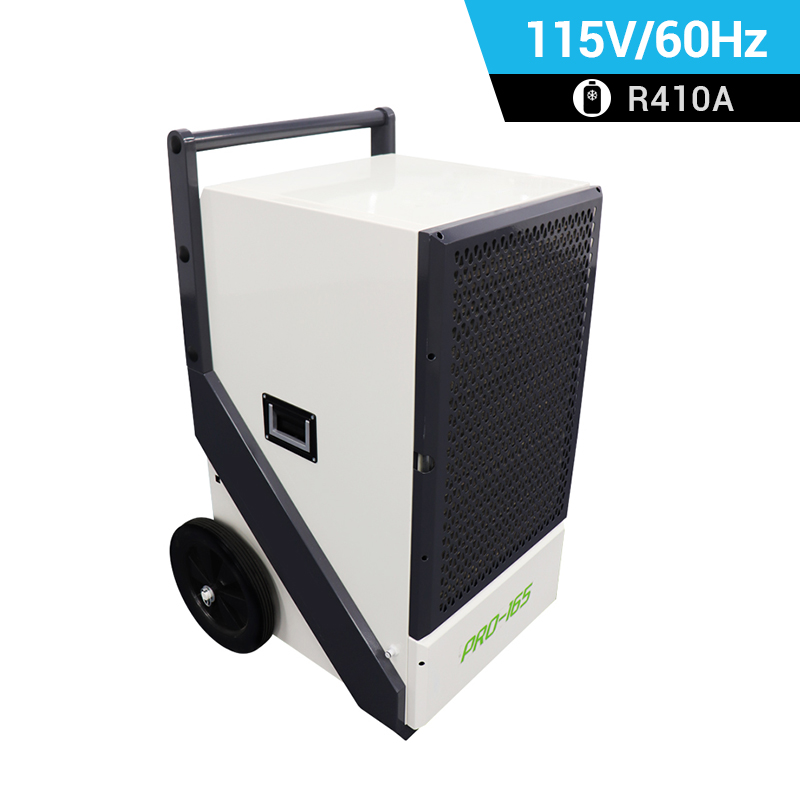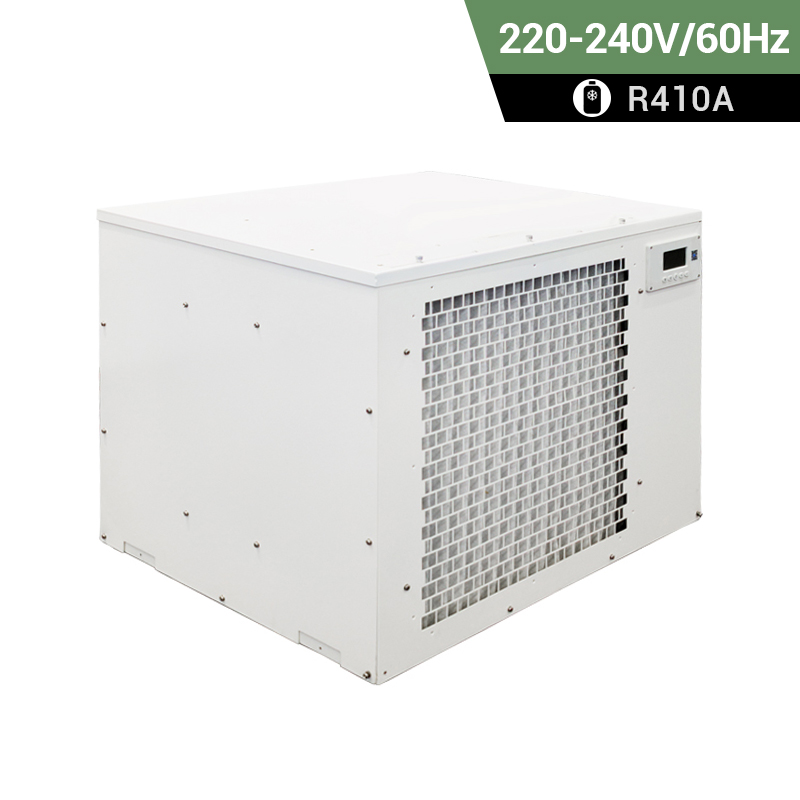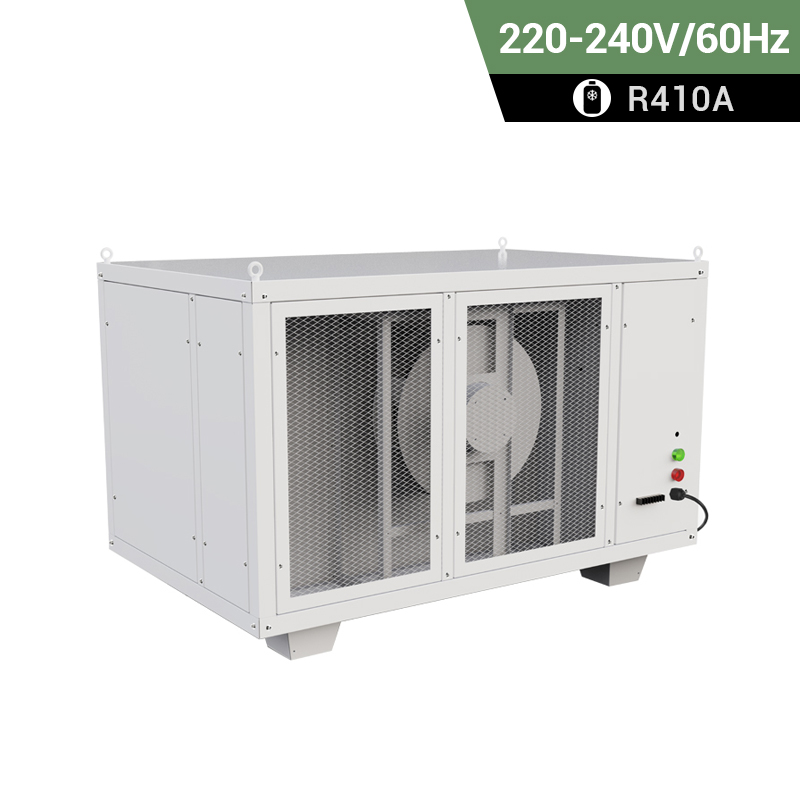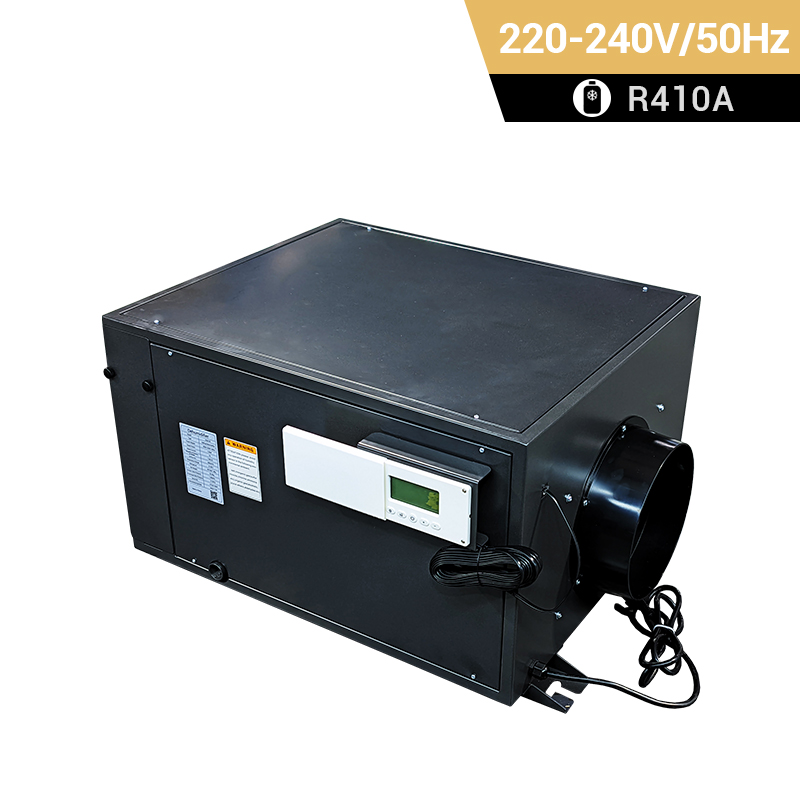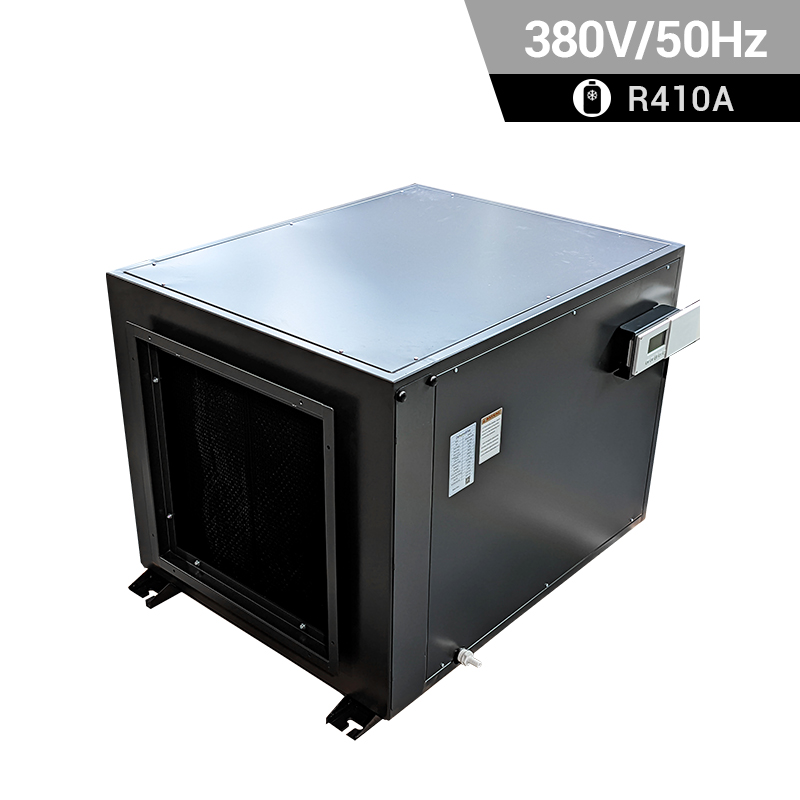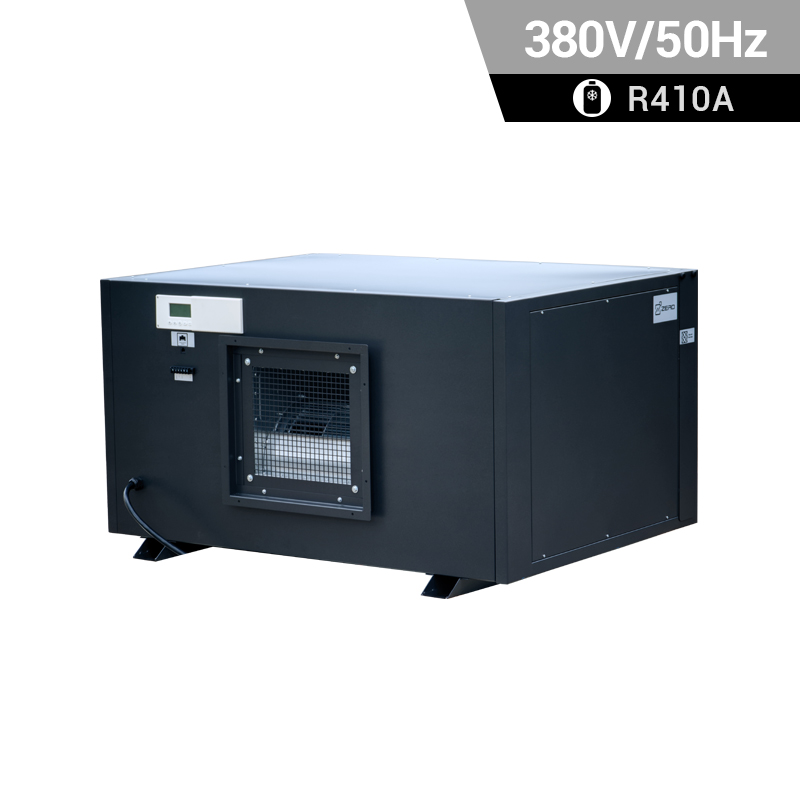Industrial Dehumidifier Working Principle
Industrial dehumidifiers are designed to handle large volumes of air and are used in various industries.
● The industrial dehumidifier draws in ambient air through a fan (circulate the air). The incoming air is passed over a set of cold coils within the dehumidifier. These coils are filled with a refrigerant, typically similar to what you'd find in an air conditioning system.
● As the warm, moisture-laden air contacts the cold coils, the temperature of the air drops. When air cools, it loses some of its capacity to hold moisture. This causes the moisture in the air to condense into water droplets on the coils. The water droplets are collected in a drip channel. They then flow down and out of the dehumidifier through a drainage system.
● The now-dry air is released back into the environment, effectively reducing the overall humidity level. The refrigerant used in the system undergoes a closed-loop cycle where it alternates between being a gas and a liquid. After absorbing heat from the incoming air, it's pumped back to the evaporator coils to start the process over again.
● The industrial refrigerant dehumidifier is equipped with a control system that monitors the humidity level in the surrounding air. When the desired humidity level is reached, the system can shut off, or switch to a lower power mode to conserve energy.
In Which Industries Does Dehumidification Play the Most Important Role?
Industrial dehumidification plays a critical role in several industries where maintaining specific humidity levels is crucial for operations, product quality, and worker safety.
1. Food Processing and Storage: Dehumidification is essential in food processing facilities to prevent spoilage, maintain product quality, and inhibit mold growth.
2. Pharmaceuticals and Healthcare: The pharmaceutical industry requires precise humidity control to maintain the integrity of drugs and prevent contamination.
3. Electronics Manufacturing: Electronic components and devices are highly sensitive to moisture, so dehumidification is critical to prevent corrosion, malfunctions, and other moisture-related issues.
4. Mold and Moisture Remediation: Industries involved in mold removal, water damage restoration, and building drying rely on industrial-strength dehumidifiers to remove excess moisture from structures and materials.
5. Aerospace and Aviation: The aerospace industry uses dehumidification in the manufacturing, storage, and maintenance of aircraft to prevent corrosion, maintain structural integrity, and ensure the safety of equipment and personnel.
6. Textiles and Paper Mills: Maintaining consistent humidity levels is essential for preventing warping, shrinking, and other damage to textile products, as well as for paper production to ensure quality and dimensional stability.
7. Chemical Processing: Chemical plants often require specific humidity levels to maintain product quality, prevent corrosion of equipment, and ensure safety in handling hazardous materials.
8. Art and Museum Conservation: Dehumidification is used in cultural heritage institutions to protect artworks, historical artifacts, and sensitive documents from moisture damage.
9. Data Centers: Precise humidity control is vital in data centers to prevent electronic components from overheating and to maintain optimal performance.
10. Greenhouses and Agriculture: In controlled agricultural environments like greenhouses, greenhouse dehumidifier can help optimize growing conditions and prevent mold or fungal growth on plants.
11. Marine and Shipbuilding: Dehumidification is crucial in shipyards and marine manufacturing to prevent corrosion and maintain the integrity of materials used in vessel construction.
12. Woodworking and Furniture Manufacturing: Wood is highly sensitive to changes in moisture levels, so dehumidification is essential to prevent warping, splitting, and other forms of damage.
Preair is a trustworthy industrial dehumidifier manufacturer that provides the best industrial dehumidifier for sale and save your industrial dehumidifier running costs.
Sales Prospects of Industrial Dehumidifiers
In the future, the sales prospects of commercial industrial dehumidifiers are generally positive, and they are expected to continue growing.
1. Increased Awareness of Humidity Control: Many industries are recognizing the importance of humidity control for various processes, product quality, and worker comfort. This awareness drives the demand for compact industrial dehumidifiers.
2. Regulatory Compliance and Standards: Certain industries, such as food processing, pharmaceuticals, and electronics manufacturing, are subject to strict regulations regarding environmental conditions. This necessitates the use of dehumidification systems to comply with industry standards.
3. Growing Industries: Industries like pharmaceuticals, electronics manufacturing, and data centers are experiencing growth, and they require precise humidity control to ensure product quality and operational efficiency.
4. Climate Change Impact: Climate change is leading to more extreme weather patterns, which can result in higher humidity levels. This can be detrimental to industries like aerospace, electronics, and manufacturing, further driving the need for dehumidification.
5. Infrastructure Development: Construction of new industrial facilities, warehouses, and commercial spaces often incorporates advanced climate control systems, including dehumidification, to ensure optimal conditions.
6. Health and Safety Concerns: Controlling humidity levels is essential for worker comfort and safety in various industries. This can lead to increased demand for dehumidifiers in workplaces.
7. Mold and Moisture Remediation: Industries involved in mold remediation and water damage restoration rely heavily on dehumidifiers for effective moisture removal and structural drying.
8. Energy Efficiency and Sustainability: Modern industrial commercial dehumidifiers are designed with energy-efficient technologies, which can appeal to industries seeking to reduce their environmental impact and energy costs.
9. Technological Advancements: Ongoing advancements in dehumidification technology are making these systems more efficient, reliable, and adaptable to various industrial settings.
10. Global Expansion: As industries expand globally, particularly into regions with varying climate conditions, the need for dehumidification solutions becomes more apparent.
11. Pandemic-Related Considerations: In response to the COVID-19 pandemic, industries like healthcare and pharmaceuticals are paying more attention to air quality and humidity control, which can contribute to increased demand for industrial dehumidifier machines.
Preair deeply roots in the dehumidifier industry and builds business relationships with companies from many fields. We not only sell high-efficiency industrial dehumidification units but also provide pragmatic solutions for different industries. We collaborate with university research teams and internet companies to constantly overcome difficulties. Over the past decade, we have obtained dozens of dehumidification technology patents, which are worthy of customer trust.
 +86-13376814803
+86-13376814803  robert@hzhongtai.com
robert@hzhongtai.com 
